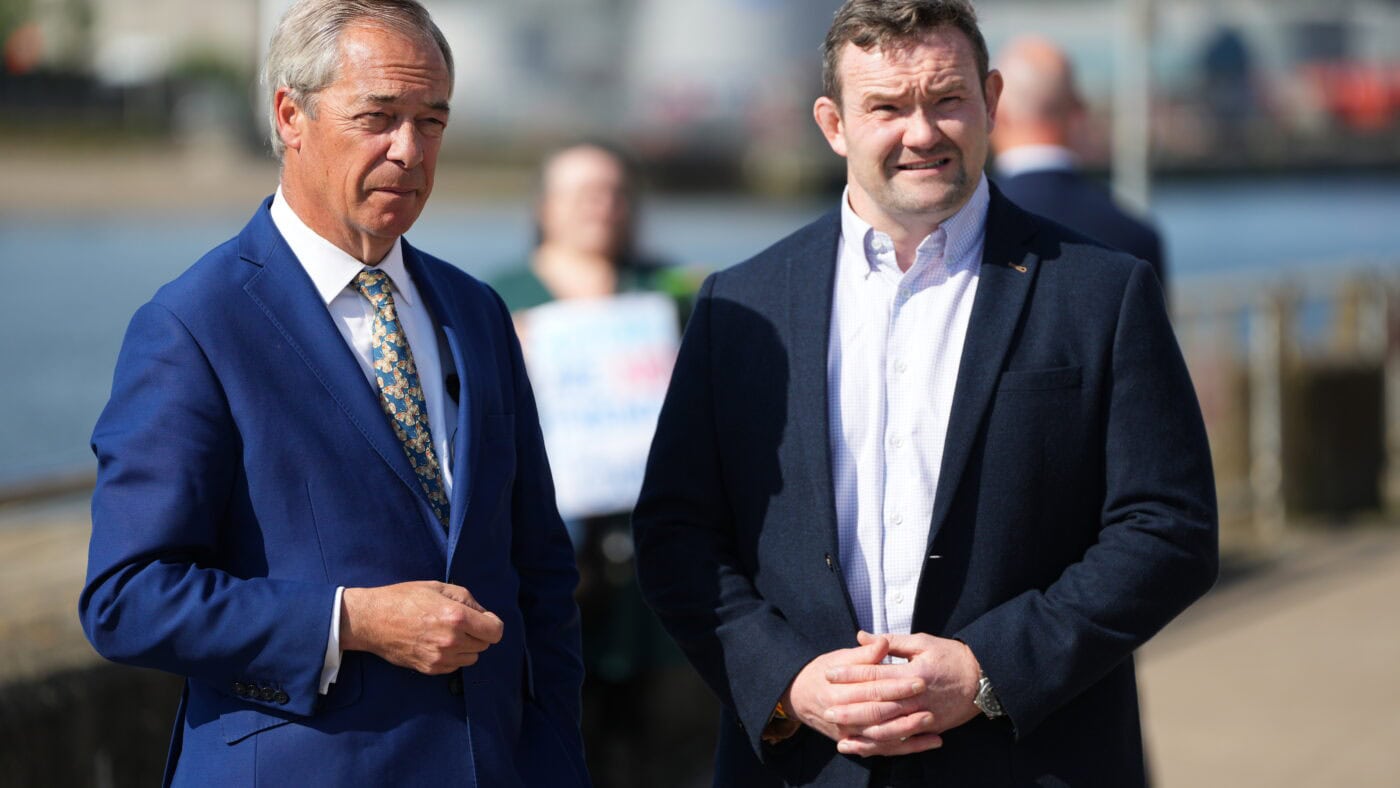There’s something of the Vikings about Reform. Just as the Norsemen raided Lindisfarne in 793, Nigel Farage and his band of berserkers took on Westminster in 2024, seizing five seats. Almost a year later and Reform have continued their march across the UK, taking over councils from Kent to Doncaster. Thus far, the political establishment, like those flailing monks of the Dark Ages, has fitfully tried to adapt.
Not content with shaking up England’s politics, Reform have now made their foray into Scotland, and look to have a fighting chance in tomorrow’s Hamilton, Larkhall and Stonehouse by-election.
On Monday, Farage, alongside newly-defected Reform councillor Duncan Massey, gave a press conference in Aberdeen setting out his vision for a turquoise Scotland. Cutting through the jeers from left-wing activists outside the venue, the Reform leader lambasted the Net Zero agenda and the destruction of the North Sea oil industry. He warned that Scotland is ‘deindustrialising in front of our very eyes’ and went on to proclaim Net Zero as ‘the new Brexit’.
In all fairness, if any country needs reform, at least with a small ‘r’, it’s Scotland.
In a nation largely reliant on its oil and gas industry, the impact of the green agenda has been felt acutely. A recent report by Aberdeen’s Robert Gordon University found that the UK oil and gas workforce declined by around 5,000 jobs, from approximately 120,000 in 2023 to around 115,000 in 2024, while jobs in renewables increased from approximately 34,000 to almost 39,000. Jobs in the renewables sector are only being created at half the rate as jobs are being lost in oil and gas.
After the years of churlish anti-Westminster posturing during the Covid pandemic, fallouts over gender recognition and high-profile scandals, Scottish politics has become a laughing stock. So much so that some Scots are becoming disillusioned with the idea of Holyrood continuing to exist at all. Philip Patrick wrote in CapX earlier this week that an influential nationalist blog is now calling for a future independence referendum to see Holyrood either become completely sovereign or be abolished, as it is seen to have become a barrier to Scottish progress in its current form.
For those of us who have railed against stagnation north and south of Hadrian’s Wall for some time, Reform’s disruption certainly has its upside. Reform’s robust approach to debates over immigration and Net Zero has genuinely shifted the Overton Window: the openness with which establishment politicians now debate contentious issues would be unrecognisable to a commentator of the 2010s. Between Kemi Badenoch’s leadership and Robert Jenrick’s social media presence, the Conservative Party – although it still has its divisions – is starting to look like an outfit with an ideology. The Tory leadership is now officially Net-Zero sceptical, firm on crime, disparaging of ‘the woke’ and thinking creatively about how to curb migration.
This is all very good, but the thing to remember is that Reform don’t exist purely as a catalyst for mainstream change. They are a political party, one with increasingly realistic ambitions for government. The right-wing upstarts are now polling at 18% in Scotland, pipping Labour at 17% to make them the country’s second-most popular party. Across the UK, another poll shows Farage’s party winning with a 74-seat majority in Parliament if a general election were held tomorrow.
Britain needs reform – that’s clear – but the big question is: can Reform deliver it? Sadly, if recent policy announcements are anything to go by, it looks like a Farage government could prolong, and in some ways worsen, the same economic malaise that Reform advertise themselves as being able to fix.
Don’t get me wrong: there’s good stuff in there. Reform’s plans to introduce a fully transferable marriage allowance is an economically sound, pro-family policy and their promise to re-examine the NHS to make it a more cost-effective system would go some way to plugging a vast drain on our finances. They’ve also made interesting noises on cutting taxes for SMEs to create a more favourable environment for entrepreneurs, and on deregulating the labour market to make it easier for businesses to operate and grow.
But then comes the not-so-good stuff. In his quest to win over those who consider themselves to have been on the rough end of the Thatcher revolution, Farage is shedding some of the laissez-faire economics of his youth. He has called for the nationalisation of British steel, which would yield scarcely any profit at all. He backed striking binmen in Birmingham when they allowed rubbish to pile up in the street. Most frustratingly for younger voters, he has made acquiescing to pensioners – a practice which has distorted our economy in favour of the old – one of Reform’s key economic offerings, pledging to reinstate winter fuel payments.
Being all things to all men might win you plaudits at the Clacton working men’s club, but a cogent national policy plan requires honesty about trade-offs. Yes, it makes for a nice photo-op to stand in solidarity with angry old biddies, but what does that mean for our future welfare bill? Reform are currently promising that all the necessary state-slashing can be done via ‘efficiency savings’ – but we’ve heard that one before.
Like the Viking berserkers, Reform have proven themselves to be effective, albeit unpredictable operators. This has indeed made politics more exciting. But running the country is a big, big step up.
Click here to subscribe to our daily briefing – the best pieces from CapX and across the web.
CapX depends on the generosity of its readers. If you value what we do, please consider making a donation.


